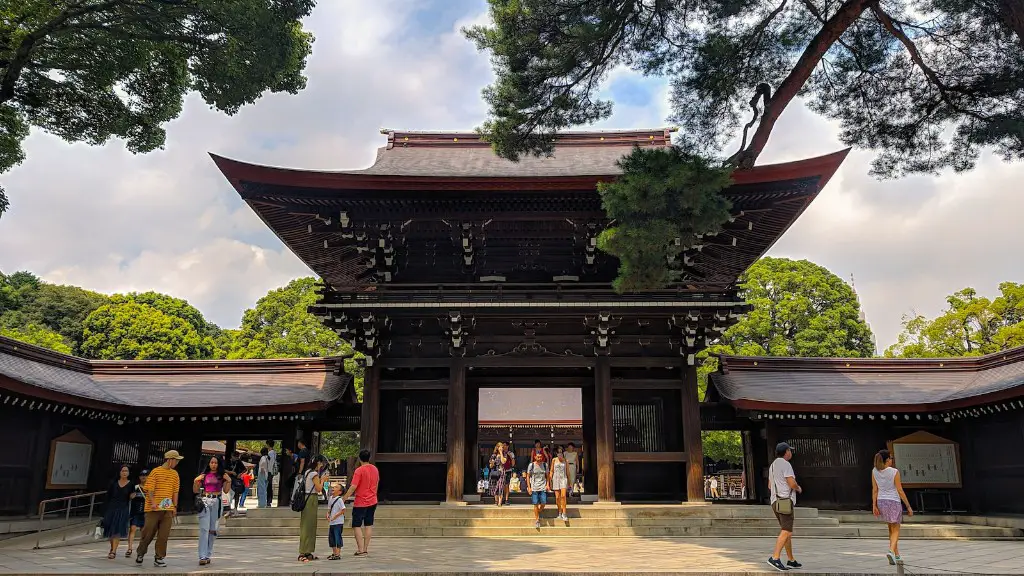Vishnu, one of the most important figures in Hinduism, is one of the trimurti, or the three chief Hindu gods, along with Shiva and Brahma. He is the preserver, protector, and caretaker of the world, and is associated with a number of symbols, symbols of preservation, and symbols of protection. He is seen as an all-encompassing force of protection, both in a spiritual and a physical sense, and his influences span from sacred texts to everyday rituals.
Vishnu’s origins predate recorded history, with references to him being found in the oldest of Hindu texts. He is described in the Rigveda as a being of “thousand-headed and thousand-eyed power”, and is seen as a powerful figure of light, as a protector of the Universe, as well as the embodiment of the cycle of life and death. Vishnu is often associated with a range of symbols, including a lotus, a conch, a bow, a mace and a discus, all of which have powerful associations.
In Hinduism, Vishnu is seen as a form of the Supreme Being, with the power to protect, preserve and renew. In a spiritual sense, he is seen as a source of divine grace, love and compassion, wielding the power to bring about harmony and healing. He is also seen as a figure of mercy and justice, with the power to bring order and to protect the weak and vulnerable.
Vishnu is often associated with the avatar, or earthly embodiments of the divine. He is seen as the source of the ten reincarnations of Vishnu, including avatars such as Rama and Krishna, who descended to Earth in order to protect the world from danger and chaos. These figures are viewed as heroic, and are a source of inspiration for many Hindus.
In a practical sense, Vishnu is seen as a source of protection for the home and for the family. He is often the focus of offerings, including food, flowers, and incense. In Hindu homes, a small statue of Vishnu is often placed in the corner of the home, as a reminder of his protective presence.
Vishnu is also a significant figure in the Hindu pantheon. He is seen as the sustainer of the Universe, and is associated with some of the most important gods and goddesses in the Hindu faith. He is often associated with Vishnu’s consort Lakshmi, and with figures such as Shiva and Brahma, who are all held to be part of the one divine power.
Vishnu is seen as an embodiment of truth, righteousness and justice, and is often invoked as an antidote to anger and chaos. He is seen as a symbol of protection and courage, and is seen as a source of spiritual sustenance and strength in difficult times. He is also a reminder that, through faith and devotion, the world can be brought back to peace and harmony.
The Teachings of Vishnu
Vishnu is often seen as a manifestation of Dharma, the cosmic law that governs and organizes life on Earth. In the Hindu worldview, it is believed that a sense of Dharma must be maintained in order to keep the universe in order and promote harmony. The teachings of Vishnu, which are detailed in the major Hindu texts, are said to promote a sense of Dharma, and emphasize the necessity for justice, compassion, and forgiveness.
Vishnu’s teachings also emphasize the importance of balance between all the different realms of creation, with the four Vedas, or scriptures, describing the relationship between the finite and the infinite, the material and the spiritual, and the living and the dead. Vishnu’s teachings thus show the importance of balance in life, and of recognizing and respecting the rights of all creatures in the world. The practice of Dharma, as taught by Vishnu, is seen as essential to maintaining balance and harmony in the world.
Vishnu is also seen as the root of spiritual growth and transformation, and the source of divine grace and enlightenment. The Bhagavad Gita, a sacred Hindu text, contains a conversation between Vishnu and the warrior-prince Arjuna, in which Vishnu reveals the path of self-knowledge and spiritual liberation. In these teachings, Vishnu is revealed as a source of great wisdom and knowledge, as well as a powerful source of strength and courage.
Vishnu is an important figure in the Hindu religion, known for his power and compassion. By embodying the principles of Dharma, he teaches us to strive for balance, harmony and justice in our lives, and reminds us of the ultimate spiritual goal of liberation. He is seen as a reminder of our connection to the divine, and a source of comfort in times of hardship.
Vishnu’s Avataras
Vishnu’s avataras, or earthly manifestations, are an important part of his story. It is said that Vishnu has taken on ten different avataras, or incarnations, in order to protect the world from chaos and restore order. The avatars of Vishnu have also become figures of inspiration and devotion, with many Hindus looking to the avatars as role models and guides to living ethically and faithfully.
The ten avataras of Vishnu are collectively known as the Dashavatara. The most popular incarnation of Vishnu is Rama, the hero of the Ramayana, who exemplifies a life of courage, righteousness, and devotion. Other popular avataras of Vishnu include Krishna, the god of love and compassion; Balarama, a figure of strength and wisdom; and Matsya, the fish-avatar, who is said to have saved the world from a great flood.
The avataras of Vishnu are said to be manifestations of the divine on Earth, and have served as powerful sources of inspiration in the Hindu faith. They embody the ideals of devotion, courage, and justice that are essential to the Hindu worldview, and are seen as powerful figures of protection, both moral and physical.
Vishnu’s avataras are also seen as embodiments of the divine energy that Vishnu brings to the world. They are seen as representative of Vishnu’s powers of preservation and protection, and are seen as divinely appointed agents of the higher powers.
Vishnu’s avataras are seen as tangible symbols of the divine on Earth, and have been a source of inspiration and devotion for Hindus throughout history. They represent the divine power of Vishnu, bringing balance, harmony, and justice to the world.
The Symbolism of Vishnu
In Hinduism, Vishnu is associated with a wide range of symbols and is often represented by a number of physical images. One of the most common symbols associated with Vishnu is the conch shell, which is seen as a symbol of the cosmic order being maintained. Vishnu is also often depicted with four arms, a bow, a mace, a conch shell, and a discus, all of which are seen as representing his power, as well as aspects of the divine.
Another symbol associated with Vishnu is the symbol of the lotus, a flower that is seen as a symbol of spiritual growth, purity and divine beauty. This symbol represents the emergence of the spiritual from the material, and is often used to represent the growth of the individual soul in its journey towards enlightenment.
Vishnu is also often depicted with a number of different animals, including elephants, horses, and fish. These animals are seen as symbolizing his power and his grace, and are said to be powerful reminders of his protective presence.
Vishnu is also often depicted with a crown, which is meant to signify his importance and his power. The crown is often seen as representing his authority and his protection, and is seen as a reminder of Vishnu’s role as the protector and guardian of the universe.
The Worship of Vishnu
Vishnu is one of the most worshiped Hindu gods, with millions of Hindus offering devotion and prayers to him daily. Vishnu is often seen as a figure that imbues his devotees with strength and courage, and his presence and power are invoked in times of hardship, when courage is needed most.
Vishnu is often worshiped through offerings of flowers, food and incense, which are seen as symbolic offerings of love, devotion and thanks. It is believed that the offerings are received by Vishnu and taken to the heavenly realms, where they are seen as a source of nourishment and protection.
Vishnu is also venerated through the chanting of mantras, or sacred syllables, which are said to be filled with the power of the divine. The mantras are meant to invoke Vishnu’s power and presence, and to bring his followers closer to him.
Vishnu is also venerated through the celebration of festivals and special days of prayer. Festivals such as Janmashtami, a festival celebrating Vishnu’s birthday, are celebrated by millions of Hindus around the world, and are seen as an opportunity to express devotion and gratitude towards Vishnu.
Vishnu is an important figure in Hinduism and is seen as a source of protection, guidance, and spiritual sustenance. He is a symbol of love and justice, and is a reminder of our connection to the divine.


